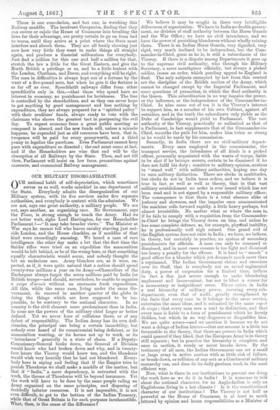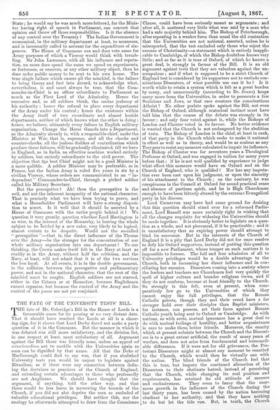OUR MILITARY DISORGANIZATION.
OUR national habit of self-depreciation, which sometimes serves us so well, works mischief in one department of the State. Everybody admits the disorganization of our Military system, with its five services under five separate authorities, and everybody is content with the admission. We are not, says one great authority, a military people. We are not, says another, an organizing race. No Government, says the Times, is strong enough to touch the Army. Had we not better wait, sighs Lord Hartington, for our Householder Parliament ?—" It may take broader views." The Minister at War says he cannot tell who leaves cavalry starving just out- side London, and the House chuckles, as if muddles of that kind were exceedingly amusing. We heard a man of rare intelligence the other day make a bet that the first time the Snider rifles were tried on an expedition the ammunition would be left behind, or be of the wrong bore, or that something equally characteristic would occur, and nobody thought the bet an audacious one. Army blunders are, as it were, ex- pected, as if it were quite natural that a nation should spend twenty-two millions a year on its Army—Chancellors of the Exchequer always forget the seven millions paid by India for British troops—and should, nevertheless, be unable to organize a corps d'arme'e without an enormous fresh expenditure. All this, while the same race, living under the same Go- vernment, do succeed in another quarter of the globe in doing the things which are here supposed to be im- possible, to be contrary to the national character. In no country is the civil element more predominant than in India. In none are the powers of the military chief larger or better defined. Yet we never hear of collisions there, or of any defect of responsibility. The Indian Army has its own defi- ciencies, the principal one being a certain immobility, but nobody ever heard of its commissariat being deficient, or its ammunition wanting, or its horses not up to work, or its " intendance " generally in a state of chaos. If a Deputy- Commissary-General broke down, the General of Division would know who had broken down and why, and in twenty- four hours the Viceroy would know too, and the blunderer would wish very heartily that he had not blundered. Every- body here is saying and feeling that if the Empire tries to punish Theodorus we shall make a muddle of the matter, but that if "India," a mere dependency, is entrusted with the work, the throne of Theodorus will be beyond insurance. Yet the work will have to be done by the same people ruling an Army organized on the same principles, and disposing of decidedly inferior resources. It is not impossible, it is not even difficult, to get to the bottom of the Indian Treasury, while that of Great Britain is for such purposes inexhaustible. What, then, is the cause of the difference ? We believe it may be sought in three very intelligible differences of organization. We have in India no double govern- ment, no division of staff authority between the Horse Guards and the War Office ; we have no civil intendance, and we have the power of punishing blunderers without wholly ruining them. There is an Indian Horse Guards, very dignified, very rigid, very much inclined to be independent, but the Com- mander-in-Chief, great as he is, is still a subordinate of the Viceroy. If there is a dispute among Departments it goes up to the supreme civil authority, who through his Military Secretary, a mere mouthpiece officially, but always a picked soldier, issues an order, which pending appeal to England is final. The only subjects exempted by law from this control are the discipline of the Britith section of the Army, which cannot be changed except by the Imperial Parliament, and some questions of promotion, in which the final authority is the Queen. This subordination in no way impairs the power, or the influence, or the independence of the Commander-in- Chief. In nine cases out of ten it is the Viceroy's interest to support him, as a member of his own Cabinet, against all outsiders, and in the tenth the subordinate only yields as the Duke of Cambridge would yield to Parliament. The vast authority of the Viceroy, practically as unlimited as that of a Parliament, in fact supplements that of the Commander-in- Chief, smooths the path for him, makes him twice as strong as he would be made by his commission.
Secondly, in India there are no civil-military depart- ments. Every man employed in the commissariat, the transport service, the intendance of all kinds is a picked officer, personally acquainted with the wants of troops, liable to be shot if he betrays secrets, certain to be dismissed if he does not fulfil his duty ; sensitive to military opinion, anxious to "stand well" with military authorities, hoping one day to earn military distinction. There are clerks in multitudes, but clerks do not in India issue orders, and we believe it is true in fact as well as well as theory, that in that vast military establishment no order is ever issued which has not been read and is not signed by a responsible military officer. The consequence is that there is a total absence alike of jealousy and slowness, and the impulse once communicated the machine rolls forward rapidly, a little heavy perhaps, but almost irresistible. No matter what or where the man is, if he fails to comply with a requisition from the Commander- in-Chief he brings the Viceroy down on him, and unless he has some complete defence, as, for example, phyeical inability, he is professionally well nigh ruined. One grand evil of the English system does not exist in India ; we have, we believe, in theory, but certainly in practice, no system of secondary punishments for officials. A man can only be censured or dismissed, and in most cases censure is too light and dismissal too heavy a penalty for the offence. It is hard to "smash" a good officer for a blunder which yet _demands much more than a reprimand. The Indian Government claims and exercises over its Staff, that is everybody not on actual regimental duty, a power of suspension for a limited time, inflicts in fact a fine just severe enough to make blundering unpleasant and inconvenient, but not to blast a career for a momentary or insignificant error. There exists in India a real hierarchy of military power, covering every sub- department, even that of audit, greatly strengthened by the facts that every man in it belongs to the same service, entertains the same ideas, and is animated by the same esprit de corps ; that every man sees a road to distinction, and that every man is liable to a form of punishment which he keenly dislikes, but which in no way disgraces or disqualifies him. We are quite aware—and we mention it because we do not want a deluge of Indian letters—that our account is a little too favourable to the theory, that there are powers in India which could quarrel if they liked, that the European Army is in theory still separate ; but in practice the hierarchy is complete, and once in motion, it rarely or never breaks down. By the testimony of all men, the Indian Government can set a small or large army in active motion with as little risk of failure, or .break-down, or collision of any sort as a Continental military monarchy can, and does do its daily garrison work in the most efficient way.
Now, what is there in our institutions to prevent our doing the work here as we do it in India ? It is nonsense to talk about the national character, for an Anglo-Indian is only an Englishman living in a hot climate ? Is it the constitutional character of our institutions ? The Viceroy is not half as powerful as the House of Commons, is at least as much fettered by opinion and home responsibilities as a Minister of State ; he would say he was much more fetterel, for the Minis- ter having right of speech in Parliament, can convert that opinion and throw off those responsibilities. Is it the absence of any control over the Treasury ? The Indian Government is economical, in the military department at least, to meanness, and is incessantly called to account for the expenditure of six- pences. The House of Commons can and does vote sums for .Army purposes of which a Viceroy would think with tremb- ling. Sir John Lawrence, with all his influence and reputa- tion, no more dare spend the sums we spend on experiments, or fortresses, or reserves, or any other military object, than he dare order public money to be sent to his own house. The true single failure which causes all the mischief, is the failure to bring theory and fact into Sword, to acknowledge what, nevertheless, is and must always be true, that the Com- mander-in-Chief is an officer subordinate to Parliament as much as the First Lord of the Admiralty. Hence the excessive and, as all soldiers think, the undue jealousy of his authority ; hence the refusal to place every department of the Army under his control ; hence the existence within the Army itself of two co-ordinate and almost hostile departments, neither of which knows what the other is doing ; hence, we believe, ultimately every failure in English military organization. Change the Horse Guards into a Department, as the Admiralty already is, with a responsible chief, make the Minister at War, that is, supreme, and all the checks and counter-checks, all the jealous dislikes of centralization which produce these failures, will be gradually eliminated, till we have in England, as in India, an effective machine worked entirely by soldiers, but entirely subordinate to the civil power. The objection that the best Chief might not be a good Minister is a mere quibble. A soldier Minister may be preferable, as in France, but the Indian Army is ruled five years in six by a civilian Viceroy, whose orders are communicated to an " in- dependent " Commander-in-Chief, through a picked soldier called, his Military Secretary.
But the prerogative? Ah! then the prerogative is the evil, and not the inherent incapacity of the national character. That is precisely what we have been trying to prove, and what a Householder Parliament will have a strong disposi- tion to assert. Is it well that it should be asserted by a House of Commons with the entire people behind it ? We question it very greatly, question whether Lord Hartington is so wise, in the interest of the Monarchy, in leaving the whole subject to be ;ettled by a new ruler, very likely to be logical, almost certain to be despotic. Would not the so-called "prerogative "—that is, the direct influence of the Throne over the Army—be the stronger for the concentration of our whole military organization into one department ? To our thinking, the Crown makes itself felt in the Navy at least as readily as in the Army, without half the criticism, and the Navy, at least, will not admit that it is of the two services the less loyal. At all events, it is in the double government, in the collision between the prerogative and parliamentary power, and not in the national character, that the root of the mischief must be sought. English soldiers are not starved, either in the Crimea or at Hounslow, because Englishmen cannot organize, but because the control of the Army and the control of the purse are not yet conjoined.































 Previous page
Previous page